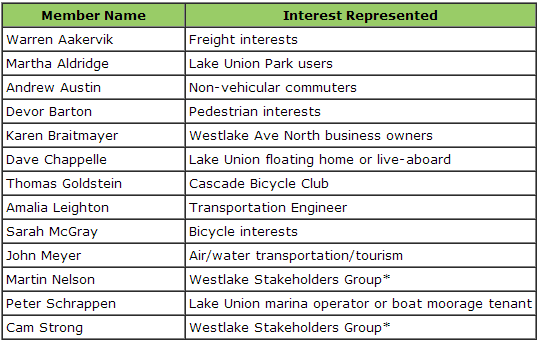
The Mayor recently appointed a design advisory committee for the Westlake Cycle Track. If you’re unfamiliar with the history of this project and its struggles, the Seattle Bike Blog provides good primers on the saga. To summarize, this committee is the direct result of a lawsuit.
For community and grassroots activists, lawsuits are a conventional tool used to force government organizations to follow the law. Groups that have an interest in specific laws will often monitor whether the government is meeting its legal requirements and sue if they aren’t. Lawsuits are vitally important because they are often the last recourse when the government isn’t fulfilling its duties. For example, the ACLU frequently uses this tactic like in a recent case of suspicionless laptop searches at border control.
Unfortunately, many activist groups use lawsuits in a more disingenuous manner. Simply filing a lawsuit has costs to the defendant. These costs can be very high even if the suit is dropped or the defendant wins. The tactic is especially insidious when suing government organizations since they are generally risk averse. This means that lawsuits can easily be used as threats or bargaining chips to exert power.
A simple test of whether or not a lawsuit is reasonable is to ask: “If the plaintiff won, would they achieve their goals?” In regards to the Westlake Cycle Track, a group of individuals opposed how the project was moving forward and filed a lawsuit to stop the Bicycle Master Plan. If you ask this question in light of this instance, the answer would be no. If the lawsuit proceeded and the plaintiff won, it wouldn’t stop the project. The plaintiffs simply used the lawsuit because it provided them leverage.
When the city was presented with the choice of delaying the Bicycle Master Plan but proceeding with the Westlake Cycle Track or ceding to the demands of this interest group so that they would drop the lawsuit, the City ceded to their demands. I can’t definitively say whether this was a good solution withoutmore intimate knowledge of the circumstances. But it deeply worries me for two reasons:
1. There is a greater danger that the Westlake Cycle Track will be implemented in a manner thatover-emphasizes this small group of stakeholders and doesn’t prioritize the safety of people first.
2. Other groups will see this as an effective tactic to get what they want from the City.
The first concern is illustrated a couple ways. First, take a look at who was chosen for the citizen advisory committee. The group filing the lawsuit was rewarded with two positions on the committee. This is in addition to the individuals that are representing similar interests. You can see a breakdown here:

Besides the composition of the group, SDOT also decided to take feedback via an online questionnaire from only residents and businesses on Westlake, rather than everyone in the city. The form had many questions asking specifically about motor vehicle access, including parking and driving. But it had no questions about safety or pedestrian and bicycle access.
That said, the advisory group has strong representation from people concerned about public access and safety. And the group is only advisory; all final decisions are left to SDOT.
It is unclear how much influence this group will have in the end, but their impact may be bigger than this specific project — which leads me to my second point. The larger concern is giving into the demands of a group that files an off-topic lawsuit.
If we concede to the demands of a group that threatens suit over an unrelated topic, there is a serious threat to important projects. Whenever an interest group is not getting what it wants, it can attack its opponents with a lawsuit. This strategy usually means that bigger, more important priorities will come under threat. These projects provide the most leverage. Furthermore, this tactic can be used endlessly. Dropping the present lawsuit doesn’t preclude this group from suingagain if SDOT comes back with recommendations they dislike. If stakeholders use this strategy enough, it can result in a completely hamstrung and ineffective government.
An environment in which people are willing to prevent important projects in order to pursue their narrow interests is unhelpful to everyone. It’s important that we do not encourage these kind of tactics. To break this cycle, we have to demonstrate that disagreements over particular projects should remain within the scope of those projects and that there is a very big downside for groups that don’t accept this. The best way to accomplish this is to support the goals of the stakeholders involved in the Westlake Cycle track who didn’t use this strategy.
You can read more and advocate for a solution that puts safety and public access first by visiting the Westlake Cycle Track page.

Owen Pickford
Owen is a solutions engineer for a software company. He has an amateur interest in urban policy, focusing on housing. His primary mode is a bicycle but isn't ashamed of riding down the hill and taking the bus back up. Feel free to tweet at him: @pickovven.

